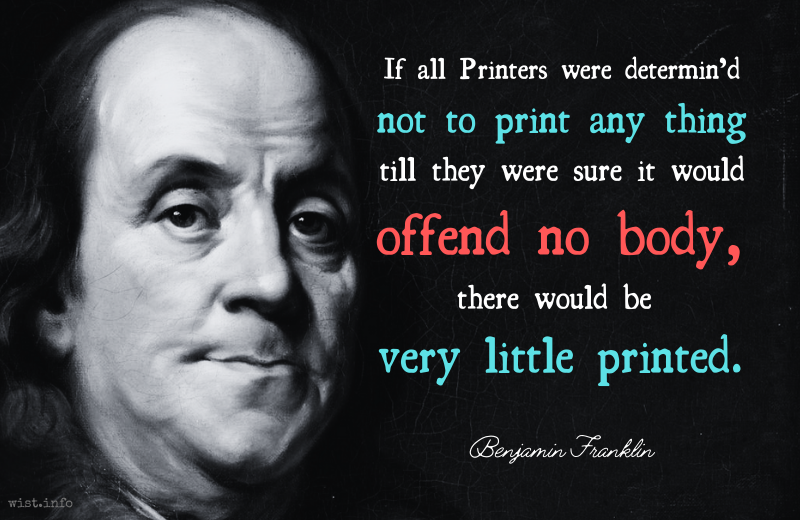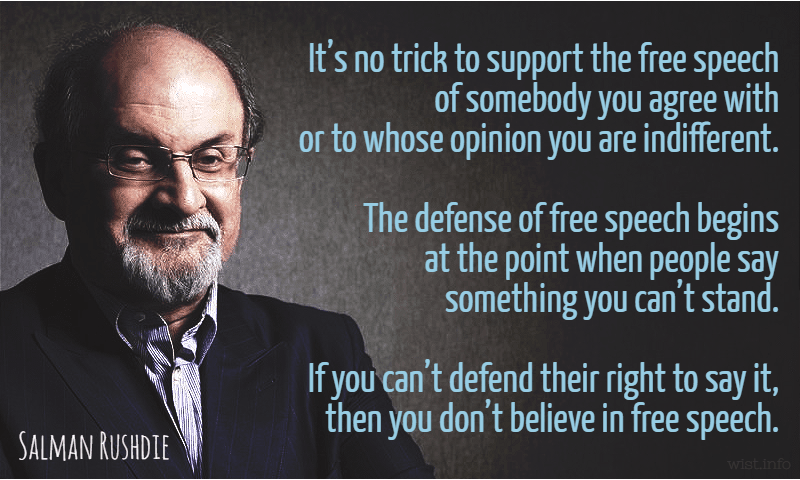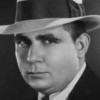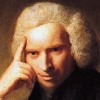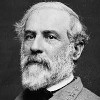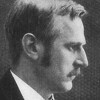No man lives without jostling and being jostled; in all ways he has to elbow himself through the world, giving and receiving offense.
Thomas Carlyle (1795-1881) Scottish essayist and historian
“Sir Walter Scott,” London and Westminster Review No. 12 and 55, Art. 2 (1838-01)
(Source)
A review of Scott's Memoirs of the Life of Sir Walter Scott, Baronet, Vols. 1-6 (1837). Reprinted in Carlyle, Critical and Miscellaneous Essays (1827-1855).
Quotations about:
offense
Note not all quotations have been tagged, so Search may find additional quotes on this topic.
I never wish to offend, but I am so foolishly shy, that I often seem negligent, when I am only kept back by my natural awkwardness.
These poor afflicted creatures spend their time with an ear against the speaker counting occurrences of the word bugger. If I had a large amount of money I should certainly found a hospital for those whose grip upon the world is so tenuous that they can be severely offended by words and phrases and yet remain all unoffended by the injustice, violence and oppression that howls daily about our ears.
Stephen Fry (b. 1957) British actor, writer, comedian
“Trefusis on Any Questions,” Loose Ends, BBC Radio 4 (c. 1987)
(Source)
Reprinted in Paperweight (1992).
That hence arises the peculiar Unhappiness of that Business, which other Callings are no way liable to; they who follow Printing being scarce able to do any thing in their way of getting a Living, which shall not probably give Offence to some, and perhaps to many; whereas the Smith, the Shoemaker, the Carpenter, or the Man of any other Trade, may work indifferently for People of all Persuasions, without offending any of them: and the Merchant may buy and sell with Jews, Turks, Hereticks, and Infidels of all sorts, and get Money by every one of them, without giving Offence to the most orthodox, of any sort; or suffering the least Censure or Ill-will on the Account from any Man whatever.
Benjamin Franklin (1706-1790) American statesman, scientist, philosopher, aphorist
“Apology for Printers,” Philadelphia Gazette (1731-06-10)
(Source)
If all Printers were determin’d not to print any thing till they were sure it would offend no body, there would be very little printed.
Benjamin Franklin (1706-1790) American statesman, scientist, philosopher, aphorist
“Apology for Printers,” Philadelphia Gazette (1731-06-10)
(Source)
By Art and Nature, if thou well recall
How Genesis begins, man ought to get
His bread, and make prosperity for all.
But the usurer contrives a third way yet,
And in herself and in her follower, Art,
Scorns Nature, for his hope is elsewhere set.[Da queste due, se tu ti rechi a mente
lo Genesì dal principio, convene
prender sua vita e avanzar la gente;
e perché l’usuriere altra via tene,
per sé natura e per la sua seguace
dispregia, poi ch’in altro pon la spene.]Dante Alighieri (1265-1321) Italian poet
The Divine Comedy [Divina Commedia], Book 1 “Inferno,” Canto 11, l. 106ff (11.106-111) [Virgil] (1309) [tr. Sayers (1949)]
(Source)
In Genesis (Gen. 2:15, 3:17-19), God ordains humanity is to survive gathering plants and resources (Nature) and through toil and "the sweat of his face" (Art or Industry) . Usurers are deemed evil because they gain wealth from interest on money-lending (or, by extension, any financial investments), producing money from money, not from productive work. They are considered in Dante's scheme as bad as blasphemers and perverts, and worse sinners than murderers or suicides. See commentary from Sayers and Durling.
(Source (Italian)). Alternate translations:
And if you recollect
Your Genesis, you'll know that from these two
Mankind should Life, Tillage the Earth receive.
But, because Us'ry takes another way,
Despising Nature and your daughter Art,
It God displeases, and incurs his wrath.
[tr. Rogers (1782), l. 101ff]
But from her hallow'd path the Miser strays,
Who lets pale A'rice warp his sordid ways,
Invet'rate foe to Nature's simple lore,
Beneath his influence grows the barren gold.
He speaks, and lo! the parent sums unfold
In monstrous births, a misbegotten store.
[tr. Boyd (1802), st. 16]
These two, if thou recall to mind
Creation’s holy book, from the beginning
Were the right source of life and excellence
To human kind. But in another path
The usurer walks; and Nature in herself
And in her follower thus he sets at nought,
Placing elsewhere his hope.
[tr. Cary (1814)]
Both these to man, if thou refresh thy mind
In Genesis' early writ, the Word ordains
His life to foster, and advance his kind.
But other way takes Usance to his gains,
And, choosing other hope, a scornful war
With Nature and her handmaid Art maintains.
[tr. Dayman (1843)]
By these two, if you recallest to thy memory Genesis at the beginning, it behoves man to gain his bread and [to prosper].
And because the usurer takes another way, he contemns Nature in herself and in her follower, placing elsewhere his hope.
[tr. Carlyle (1849)]
From these two, if right considered in the mind,
From first of Genesis the truth receive,
Life and advancement to the nations gave.
But usury has ta'en another way,
Despising nature and her handmaid Art,
Far other hopes his light of life impart.
[tr. Bannerman (1850)]
From these two, then, if thou in mem'ry hold'st
The earlier Genesis, it is decreed
That life must spring, and man's increase must come.
But then the usurer treads another path;
Nature and her attendant both he scorns,
Since in another means he places hope.
[tr. Johnston (1867)]
From these two, if thou bringest to thy mind
Genesis at the beginning, it behoves
Mankind to gain their life and to advance;
And since the usurer takes another way,
Nature herself and in her follower
Disdains he, for elsewhere he puts his hope.
[tr. Longfellow (1867)]
From these two, if thou bring to thy mind Genesis, towards the beginning, it behoves folk to take their life, and to prosper. And because the usurer holds another course, he despises Nature both for herself and for her follower; because he places his hope in another thing.
[tr. Butler (1885)]
From Art and Nature, if thou bring'st to mind
The verse of Genesis, 'tis doomed alone
That man should live and carry on his kind.
And since to usurers other ways are known,
Both Nature and her follower stand confest
Outraged by those whose trust is elsewhere shown.
[tr. Minchin (1885)]
By means of these two, if thou bringest to mind Genesis at its beginning, it behoves mankind to obtain their livelihood and to thrive. But because the usurer takes another course, he despises Nature in herself, and in her follower, since upon other thing he sets his hope.
[tr. Norton (1892)]
By these two, if thou recallest to thy mind an early page in Genesis, doth it behove mankind to win their means of life, and to excel. And for that the usurer goeth another way, he slighteth nature both in herself and follower, putting his trust elsewhere.
[tr. Sullivan (1893)]
From these two, if thou bring' st to recollection
Genesis at its opening, it must needs be
That folk do take their living and make progress.
And, since the usurer keeps another pathway,
Nature, both for herself and for her daughter,
Contemns he, since his hope elsewhere he places.
[tr. Griffith (1908)]
By these two, if thou recall to mind Genesis near the beginning, it behoves mankind to gain their livelihood and their advancement, and because the usurer takes another way he despises nature both in herself and in her follower, setting his hope elsewhere.
[tr. Sinclair (1939)]
By these two, if thy memory Genesis
Recalls, and its beginning, man hath need
To gain his bread and foster earthly bliss.
But the usurer, since he will not thus proceed,
Flouts Nature's follower and herself also,
Setting his wealth another way to breed.
[tr. Binyon (1943)]
By this, recalling the Old Testament
near the beginning of Genesis, you will see
that in the will of Providence, man was meant
to labor and to prosper. But usurers,
by seeking their increase in other ways,
scorn Nature in herself and her followers.
[tr. Ciardi (1954)]
By these two, if you remember Genesis at the beginning, it behooves man to gain his bread and to prosper. But because the usurer takes another way, he contemns Nature in herself and in her follower, for he puts his hope elsewhere.
[tr. Singleton (1970)]
From Art and Nature man was meant to take
his daily bread to live -- if you recall
the book of Genesis near the beginning;
but the usurer, adopting another means,
scorns Nature in herself and in her pupil,
Art -- he invests his hope in something else.
[tr. Musa (1971)]
From these two, art and nature, it is fitting,
if you recall how Genesis begins,
for men to make their way, to gain their living;
and since the usurer prefers another
pathway, he scorns both nature in herself
and art, her follower; his hope is elsewhere.
[tr. Mandelbaum (1980)]
From these two, if you recall to mind
The beginning of Genesis, it is proper for man
To win his bread and to advance his race:
And because the usurer takes another way,
Treating nature and what follows from her
Contemptuously, he puts his hopes elsewhere.
[tr. Sisson (1981)]
By these two, man should thrive and gain his bread --
If you remember Genesis -- from the start
But since the usurer takes a different way,
He contemns Nature both in her own sort
And in her follower as well, while he
Chooses to invest his hope another place.
[tr. Pinsky (1994)]
From these two, if you bring to mind the beginning of Genesis, we must draw our life and advance our people. and because the usurer holds another way, he scorns Nature in herself and in her follower, since he puts his hope in something else.
[tr. Durling (1996)]
By these two, art and nature, man must earn his bread and flourish, if you recall to mind Genesis, near its beginning.
Because the usurer holds to another course, he denies Nature, in herself, and in that which follows her ways, putting his hopes elsewhere.
[tr. Kline (2002)]
From these two principles -- if you recall
the opening lines of Genesis -- we're bound to draw
our living strength and multiply our people.
But usurers adopt a different course.
They place their hopes in other things, and thus
make mock of Nature's self and her close kin.
[tr. Kirkpatrick (2006)]
By toil and nature, if you remember Genesis,
near the beginning, it is man's lot
to earn his bread and prosper.
The usurer, who takes another path,
scorns nature in herself and in her follower,
and elsewhere sets his hopes.
[tr. Hollander/Hollander (2007)]
Nature and human labor -- as Genesis teaches
In its very first pages -- combine to let man live
And thereby take his people forward. But those leeches
Who practice usury abandon the given
Path for another, despising Nature's way
And her honest pupils: gold, not God, is their living.
[tr. Raffel (2010)]
By this twin element
Of nature's force and human effort -- see
The book of Genesis, near the beginning, where
Men are enjoined to earn their bread by sweat --
Humanity needs must accept its share
Of effort to advance. The trade in debt
Ignores that pact. His course set otherwise
The usurer holds nature in contempt
Both in herself and in her human guise,
Simply by how he holds himself exempt
And sets his hopes elsewhere.
[tr. James (2013), l. 112ff]
A tinker’s debt is always paid:
Once for any simple trade.
Twice for freely given aid.
Thrice for any insult made.
Wish they’d let us write about the Little Rock situation. Funny, there were about seven or eight dramatic treatments of the Hungarian uprising but the spectacle of adult whites taunting a couple of defenseless little Negro girls is considered controversial. Wrong? That’s not controversy. If anybody takes the pro side in that particular battle, they’d better change flags.
Rod Serling (1924-1975) American screenwriter, playwright, television producer, narrator
Comment (1957), in Anne Serling, As I Knew Him: My Dad, Rod Serling (2013)
(Source)
Serling frequently complained of TV commercial sponsors (and the networks that depended on them) refusing to allow any TV dramas that might offend viewers, especially Southerners -- in this instance, referring to the controversy over Arkansas school integration.
Of course, there are those who don’t eat lamb chops, for moral reasons. There are also those who rise before daybreak and leap into a cold shower in February; those hwo disapprove of idleness, gin rummy, slang, dancing, unauthorized sex, naps, socialism, and Jacuzzis for moral reasons. They enjoy it; moral indignation is a pleasure, often the only pleasure, in many lives. It’s also one of the few pleasures people feel obliged to force on other people.
PERICLES: Few love to hear the sins they love to act.
William Shakespeare (1564-1616) English dramatist and poet
Pericles, Act 1, sc. 1, l. 95 (1.1.95) (1607) [with George Wilkins]
(Source)
There are silences harder to take back than words.
James Richardson (b. 1950) American poet
“Vectors: 56 Aphorisms and Ten-second Essays,” Michigan Quarterly Review, # 3 (Spring 1999)
(Source)
‘But people, the ordinary faithful, are offended by crude comic blasphemies,’ voices are raised to tell me. Yes indeed. But what of my religion? I am a lover of truth, a worshipper of freedom, a celebrant at the altar of language and purity and tolerance. That is my religion, and every day I am sorely, grossly, heinously and deeply offended, wounded, mortified and injured by a thousand different blasphemies against it. When the fundamental canons of truth, honesty, compassion and decency are hourly assaulted by fatuous bishops, pompous, illiberal and ignorant priests, politicians and prelates, sanctimonious censors, self-appointed moralists and busy-bodies, what recourse of ancient laws have I? None whatever. Nor would I ask for any. For unlike these blistering imbeciles my belief in my religion is strong and I know that lies will always fail and indecency and intolerance will always perish.
Stephen Fry (b. 1957) British actor, writer, comedian
“Trefusis Blasphemes,” Loose Ends, BBC Radio 4 (1986)
(Source)
Reprinted in Paperweight (1992).
There is more than one way to burn a book. And the world is full of people running about with lit matches. Every minority, be it Baptist/Unitarian, Irish/Italian/Octogenarian/Zen Buddhist, Zionist/Seventh-day Adventist, Women’s Lib/Republican, Mattachine/Four Square Gospel feels it has the will, the right, the duty to douse the kerosene, light the fuse. Every dimwit editor who sees himself as the source of all dreary blanc-mange plain-porridge unleavened literature licks his guillotine and eyes the neck of any author who dares to speak above a whisper or write above a nursery rhyme.
Ray Bradbury (1920-2012) American writer, futurist, fabulist
Fahrenheit 451, “Coda” Afterword (1979 ed.)
(Source)
Bradbury wrote the coda to his dystopian 1953 novel about censorship when he found out that "offensive" phrases had been deleted from high school editions of the book.
A Reverend Donald Wildmon in Mississippi heard something on the radio that he didn’t like. Well, Reverend, did anyone ever tell you there are two knobs on the radio? Two. Knobs. On the radio. Of course, I’m sure the reverend isn’t that comfortable with anything that has two knobs on it … But hey, Reverend, there are two knobs on the radio! One of them turns the radio off, and the other one changes the station! Imagine that, Reverend, you can actually change the station! It’s called freedom of choice, and it’s one of the principles this country was founded upon. Look it up in the library, Reverend, if you have any of them left when you’ve finished burning all the books.
It’s no trick to support the free speech of somebody you agree with or to whose opinion you are indifferent. The defense of free speech begins at the point when people say something you can’t stand. If you can’t defend their right to say it, then you don’t believe in free speech.
Salman Rushdie (b. 1947) Indian novelist
“Do we have to fight the battle for the Enlightenment all over again?” The Independent (22 Jan 2005)
(Source)
Sure, there are differences in degree, but we’ve got to stop comparing wounds and go out after the system that does the wounding.
For to be civilized is to be incapable of giving unnecessary offense, it is to have some quality of consideration for all who cross our path.
Agnes Repplier (1855-1950) American writer
“A Question of Politeness,” Americans and Others (1912)
(Source)
Just because you’re offended, doesn’t mean you’re right.
If you are threatened or offended by people disagreeing, challenging or even ridiculing your faith, your faith can’t be that strong.
That hatred springs more from self-contempt than from a legitimate grievance is seen in the intimate connection between hatred and a guilty conscience. There is perhaps no surer way of infecting ourselves with virulent hatred toward a person than by doing him a grave injustice. That others have a just grievance against us is a more potent reason for hating them than that we have a just grievance against them.
Eric Hoffer (1902-1983) American writer, philosopher, longshoreman
True Believer: Thoughts on the Nature of Mass Movements, Part 3, ch. 14, § 69 (1951)
(Source)
There are two insults which no human being will endure: The assertion that he hasn’t a sense of humor, and the doubly impertinent assertion that he has never known trouble.
Sinclair Lewis (1885-1951) American novelist, playwright
Main Street, ch. 31, sec. 2 (1920)
(Source)
Another thing. This idea of “I’m offended”. Well I’ve got news for you. I’m offended by a lot of things too. Where do I send my list? Life is offensive, you know what I mean? Just get in touch with your outer adult, and grow up, and move on. Reasonable people don’t write letters because (a) they have lives and (b), they understand it’s just TV, (c) if they see something they don’t like, something they do like might be on later. I’ve seen many comics I’ve hated. I’ve seen many religious shows that have offended me. I’ve never written a letter. I just go about my life.
Bill Hicks (1961-1994) American stand-up comedian, social critic, satirist, musician [William Melvin "Bill" Hicks]
Interview with Howard Stern (1993)
(Source)
I’ll not willingly offend,
Nor be easily offended;
What’s amiss I’ll strive to mend,
And endure what can’t be mended.Isaac Watts (1674-1748) English theologian and hymnodist
Poems, “Moral Songs: #6 Good Resolutions”
(Source)
In Samuel Johnson, Works of English Poets, vol. 46 (1779)
As nothing is more provoking to some tempers than raillery, a prudent person will not always be satirically witty where he can, but only where he may without offence. For he will consider the that the finest stroke of raillery is but a witticism; and that there is hardly any person so mean, whose good will is not preferable to the pleasure of a horse-laugh.
James Burgh (1714-1775) British politician and writer
The Dignity of Human Nature, Sec. 5 “Miscellaneous Thoughts on Prudence in Conversation” (1754)
(Source)
Every man is not ambitious, or courteous, or passionate; but every man has pride enough in his composition to feel and resent the least slight and contempt. Remember, therefore, most carefully to conceal your contempt, however just, wherever you would not make an implacable enemy. Men are much more unwilling to have their weaknesses and their imperfections known, than their crimes; and if you hint to a man that you think him silly, ignorant, or even ill-bred, or awkward, he will hate you more and longer, than if you tell him plainly, that you think him a rogue.
Lord Chesterfield (1694-1773) English statesman, wit [Philip Dormer Stanhope]
Letter to his son, #161 (5 Sep 1748)
(Source)
ANGER: Of the Seven Deadly Sins, anger is possibly the most fun. To lick your wounds, to smack your lips over grievances long past, to roll over your tongue the prospect of bitter confrontations still to come, to savor to the last toothsome morsel both the pain you are given and the pain you are giving back — in many ways it is a feast fit for a king. The chief drawback is that what you are wolfing down is yourself. The skeleton at the feast is you.
Repentanse should be the effekt ov love — not fear.
[Repentance should be the effect of love — not fear.]
Josh Billings (1818-1885) American humorist, aphorist [pseud. of Henry Wheeler Shaw]
Everybody’s Friend, Or; Josh Billing’s Encyclopedia and Proverbial Philosophy of Wit and Humor, ch. 155 “Affurisms: Ink Lings” (1874)
(Source)
The greatest favors may be done so awkwardly and so bunglingly as to offend; and disagreeable things may be done so agreeably as almost to oblige.
Lord Chesterfield (1694-1773) English statesman, wit [Philip Dormer Stanhope]
Letter to his son, #249 (7 Apr 1751)
(Source)
I cannot forgive my friends for dying; I do not find these vanishing acts of theirs at all amusing.
Logan Pearsall Smith (1865-1946) American-English essayist, editor, anthologist
Afterthoughts, ch. 2 “Age and Death” (1931)
(Source)
The idea that any kind of free society can be constructed in which people will never be offended or insulted is absurd. So too is the notion that people should have the right to call on the law to defend them against being offended or insulted. A fundamental decision needs to be made: do we want to live in a free society or not? Democracy is not a tea party where people sit around making polite conversation. In democracies people get extremely upset with each other. They argue vehemently against each other’s positions. (But they don’t shoot.)
Salman Rushdie (b. 1947) Indian novelist
“Do we have to fight the battle for the Enlightenment all over again?” The Independent (22 Jan 2005)
(Source)






